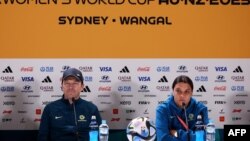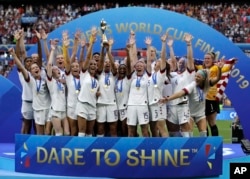The Women’s soccer World Cup kicks off in New Zealand and Australia Thursday. More than a million tickets have already been sold for the 64 games. FIFA, the sport’s international governing body, believes it will be the most-watched women’s soccer tournament.
Thirty-two nations will take part in the World Cup co-hosted by Australia and New Zealand.
In 1991, when the event was first held, there were just 12 teams.
The United States is the defending champion and hopes to become the first team to win the trophy three times in a row. With matches as far apart as Perth in Western Australia to the New Zealand capital, Wellington, this tournament will be like no other in terms of distances. Ireland, for example, will travel 8,000 kilometers in the group stage alone.
But as the tournament prepares to start, there is controversy over the competition’s prize money.
The winners of the men’s World Cup receive $440 million, but for women the prize is $110 million.
The Australian women’s national team, known as the Matildas, released a video Monday to complain about the disparity and lack of an equal prize.
Midfield player Tameka Yallop said while the Matildas have some of the same rights as Australia’s men’s team, the Socceroos, there is still inequality.
“Collective bargaining has allowed us to ensure that we now get the same conditions as the Socceroos with one exception. FIFA will still only offer women one-quarter as much prize money as men for the same achievement,” said Yallop.
Soccer is Australia’s most popular sport in terms of participation.
There’s a feeling among former players and supporters that New Zealand and Australia are hosting the tournament at a pivotal time for women’s football. Its profile has never been higher, and, arguably, the standards never better.
Kate Gill is a former Matildas Captain and Co-Chief Executive at Professional Footballers Australia, the player’s union.
She told the Australian Broadcasting Corp. that she hopes the tournament will encourage fans to also support Australia’s domestic competitions.
“There would be a number of young boys and girls that are really going to fall in love with the game and want to get involved in football and we do have two domestic codes, both the A-League Men and the A-League Women. They are crying out for some love in that respect, so if we could, kind of, transition that enthusiasm and fans could start showing up in support of that I think that would be the big call out for this World Cup,” she said.
The highest ranked country going into the World Cup is the United States, followed by Germany, Sweden, England and France. Co-hosts Australia are ranked tenth by FIFA, while New Zealand is 26th.
The opening match will be between New Zealand and Norway at Eden Park in Auckland, on July 20. A few hours later in Sydney, Australia plays Ireland.
The final will take place in Australia a month later at Sydney’s Olympic Stadium on August 20.







